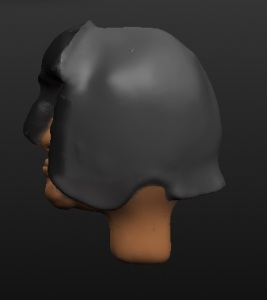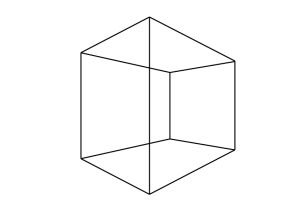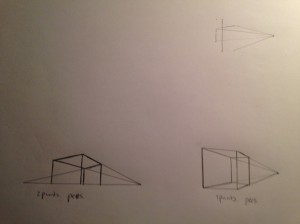3D klei
Expressief karakter
3D Modeling
Opdracht 7 – Storyboard
Oefening 19 – Cartoon
Oefening 18 – Perspectief
Oefening 17 – Modelsheet
Opdracht 6 – Character in game world
Opdracht 4 – Game Dimensions
Ask yourself the questions about each of the following game world dimensions.
PHYSICAL DIMENSION
1. Does my game require a physical dimension? What is it used for? Is it an essential part of gameplay or merely cosmetic?
Ja zeker, de wereld moet een bepaalde sfeer uitstralen en deze overbrengen op de speler, bepaalde emoties en motivaties moeten loskomen.
2. Leaving aside issues of implementation or display, how many imaginary spatial dimensions does my game require? If there are three or more, can objects move continuously through the third and higher dimensions, or are these dimensions partitioned into discrete “layers” or zones?
De ‘hoofdzone’ zal een kasteel zijn met het land eromheen. De zone daar omheen is het land van de koning en de buurlanden. Maar daar zal het spel niet toereikend voor zijn. De grens van het spel ligt rondom het kasteel.
3. How big is my game world, in light-years or inches? Is accuracy of scale critical, as in a football game, or not, as in a cartoon-like action game?
Ga uit van een paar hectare, een kasteel met een bijhorend dorpje en het land erom heen.
4. Will my game need more than one scale, for indoor versus outdoor areas, for example? How many will it actually require?
Het is een menselijke wereld en de maten voor alle zones zullen hetzelfde zijn.
5. How am I going to handle the relative sizes of objects and people? What about their relative speeds of movement?
De karakters zullen prominent op de voorgrond aanwezig zijn, de andere objecten(bomen, struiken, rekwisieten) wat meer op de achtergrond.
6. How is my world bounded? Am I going to make an effort to disguise the “edge of the world,” and if so, with what? What happens if the player tries to go beyond it?
Het spel wordt liniair vertelt en loods je langs de hele game-wereld en tot de ‘grenzen’. Je kan niet verder dan deze aangegeven grenzen.
TEMPORAL DIMENSION
1. Is time a meaningful element of my game? Does the passage of time change anything in the game world even if the player does nothing, or does the world simply sit still and wait for the player to do something?
Tijd als in uren, maanden, jaren niet. Maar er wordt zeker bijgehouden hoeveel tidj besteed aan de game.
2. If time does change the world, what effects does it have? Does food decay, and do light bulbs burn out?
Tijd zal geen invloed hebben op de gameplay.
3. How does time affect the player’s avatar? Does he get hungry or tired?
Tijd zal geen invloed hebben op de gameplay.
4. What is the actual purpose of including time in my game? Is it only a part of the atmosphere, or is it an essential part of the gameplay?
Er zal een dag/nacht cyclus zijn in de game, om wel gevoel van tijd aan te geven, maar het heeft geen effect op de gameplay.
5. Is there a time scale for my game? Do I need to have measurable quantities of time, such as hours, days, and years, or can I just let time go by without bothering to measure it? Does the player need a clock to keep track of time?
Nee, tijd als in uren, maanden, jaren bestaat niet in de game. Het zal daardoor ook geen invloed hebben op de gameplay.
6. Are there periods of time that I’m going to skip or do without? Is this going to be visible to the player, or will it happen seamlessly?
Er zullen flashbacks voorkomen in de game en deze worden vertoond door een automatisch afspelend filmpje.
7. Do I need to implement day and night? If I do, what will make night different from day? Will it merely look different, or will it have other effects as well? What about seasons?
Er zal een dag/nachtcyclus zijn, ’s nachts is het donker, overdag licht. ‘S nachts is het ook ‘gevaarlijker’ op straat.
8. Will any of the time in my game need to be anomalous? If so, why? Will that bother the player? Do I need to explain it away, and if so, how?
De tijd zal altijd gelijk lopen en niet vertraagd of versnelt worden.
9. Should the player be allowed to adjust time in any way? Why, how, and when?
Nee, de tijd wordt bepaald door het verhaal en niet door de speler.
ENVIRONMENTAL DIMENSION
1. Is my game world set in a particular historical period or geographic location? When and where? Is it an alternate reality, and if so, what makes it different from ours?
De game speelt zich af in de late middeleeuwen en in een verzonnen wereld. Het zou Nederland kunnen zijn in de Middeleeuwen, qua omgeving en klimaat.
2. Are there any people in my game world? What are they like? Do they have a complex, highly organized society or a simple, tribal one? How do they govern themselves? How is this social structure reflected in their physical surroundings?
Er zijn verschillende standen als karakters in mijn wereld. Een adelijke familie, boeren en geestelijken zijn de meest voorkomenden.
Are there different classes of people, guilds, or specialized occupations?
De adelijke familie: staat boven iedereen, ze regeren in de wereld. De boeren: leven een leven zoals de regeerder zeggen, zij werken voor hen. Geestelijken: zij leven in ee klooster net buiten de stad.
3. What do my people value? Trade, martial prowess, imperialism, peace? What kinds of lives do they lead in pursuit of these ends? Are they hunters, nomadic, agrarian, industrialized, even postindustrial? How does this affect their buildings and clothing?
Ze leven vooral van veeteelt en graanverbouw. Ze leven in vrede dus de verdediging kost weinig geld, waardoor iedereen tevreden is. Het normale volk leeft in simpele huisjes en boerderijen, de geestelijken in een klooster en de adelijke familie in een kasteel.
4. Are my people superstitious or religious? Do they have institutions or religious practices that will be visible in the game? Are there religious buildings? Do the people carry charms or display spiritual emblems?
De inwoners zijn allemaal Katholiek de een strenger als de ander. Er is een klooster en een kerk in het dorp.
5. What are my people’s aesthetics like? Are they flamboyant or reserved, chaotic or orderly, bright or subtle? What colors do they like? Do they prefer straight lines or curves?
Het zijn redelijk introverte mensen en leven hun leven, er gebeurd weinig spannends in het dorp, alleen als het oorlog is. De kleur vna het dorp is paars, maar de onderdanen lopen meestal in bruin/grijs achtige kledij.
6. If there aren’t any people in the game, what are there instead, and what do they look like and how do they behave?
NVT
7. Does my game take place indoors or outdoors, or both? If indoors, what are the furnishings and interior decor like? If outdoors, what is the geography and architecture like?
Allebei, er zijn levels in huizen en kastelen, maar ook buiten in het dorp en op het land.
8. What are the style and mood of my game? How am I going to create them with art, sound, and music?
Typsich Middeleeuws, dus gothische kerken, landelijke boederijen veel bruin en grijs, donker. De stijl van het adelijk huis is paars.
9. How much detail can I afford in my game? Will it be rich and varied or sparse and uncluttered? How does this affect the way the game is played?
Er zit detail in, maar niet te veel.
EMOTIONAL DIMENSION
1. Does my game have a significant emotional dimension? What emotions will my game world include?
Ze mensen leven hun leven en bedrsgen zich over het algemeen introvert. Verraad, luiheid en blijheid karakteriseren de inwoners.
2. How does emotion serve the entertainment value of my game? Is it a key element of the plot? Does it motivate characters in the game or the player himself?
Het is zeker geen key element van de game, maar niet geheel onbelangrijk.
3. What emotions will I try to inspire in the player? How will I do this? What will be at stake?
ETHICAL DIMENSION
1. What constitutes right and wrong in my game? What player actions do I reward and what do I punish?
Er zijn bepaalde normen en waarden in de game. Je bent geen badguy, dus stelen etc. wordt bestraft. Maar mensen helpen, missies voltooien en het land redden van een oorlog wordt zeker beloond.
2. How will I explain the ethical dimensions of the world to the player? What tells him how to behave and what is expected of him?
Ze kan vooral vrij rondlopen, maar bij bepaalde missies word je wel geholpen door een wizard.
3. If my game world includes conflict or competition, is it represented as violence or as something else (racing to a finish, winning an economic competition, outmaneuvering the other side)?
Je moet je land redden van indringers en oorlogen door verschillende missies te volbrengen, maar ook binnen de stadpoorten zijn en conflicten waarbij je je moet bemoeien.
4. What range of choices am I offering my player? Are there both violent and nonviolent ways to accomplish something? Is the player rewarded in any way for minimizing casualties, or is he punished for ignoring them?
Je kan vooral je eigen gang gaan en doen wat je zelf wilt, maar tijdens een missies zijn er wel richtlijnen die je moeten volgen.
5. In many games, the end—winning the game—justifies any means that the game allows. Do I want to define the victory conditions in such a way that not all means are acceptable?
Je zal verder leven in vrede.
6. Are any other ethical questions present in my game world? Can my player lie, cheat, steal, break promises, or double-cross anyone? Can she abuse, torture, or enslave anyone? Are there positive or negative consequences for these actions?
Je kan stelen, verraden ne misdaden begaan maar daar staat een straf op.
7. Does my world contain any ethical ambiguities or moral dilemmas? How does making one choice over another affect the player, the plot, and the gameplay?
Nee.
8. How realistic is my portrayal of violence? Does the realism appropriately serve the entertainment value of the game?
Niet heel realistisch, er zijn monster die je in 1x kunnen doodmaken, maar dat is niet leuk voor de gameplay.



















